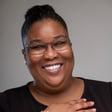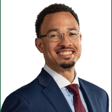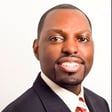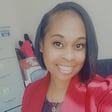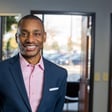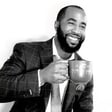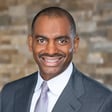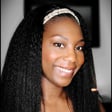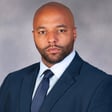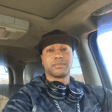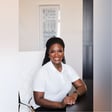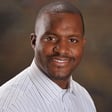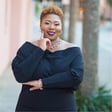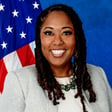Seeing Opportunities: The Keyhole Metaphor
00:00:00
Speaker
It's a keyhole, like one of those old school keyholes. And so you can see, you can see straight through it, but you still know that you're looking through a keyhole. You see an amazing world on the other side. Sun is shining, you know, green as far as the eye can see. You know, you can see the leaves blowing or the trees blowing in the wind, but you're on this side of that keyhole.
00:00:30
Speaker
And so my biggest thing is trying to teach an individual how to open up that door to get to those greener pastures.
Podcast Introduction: Take Your Homeboy to Work Day
00:00:41
Speaker
What's up world? Have you ever wondered what does my friend or cousin or partner actually do at work? Listen to Take Your Homeboy to Work Day podcast, the premier podcast to learn about careers and trade.
00:00:56
Speaker
Each episode, I interview guests from different professions and dive into the arcs of jobs held, the education and training received, the skills and experiences acquired along the way, of course, how much you can earn, and then also the intrinsic fulfillment that motivates them. So for anyone interested in hearing the firsthand experience of a specific career, these conversations are your launching pad.
Career Focus: Family Physician Dr. Sean Johnson
00:01:23
Speaker
Today's episode is about medical doctors and physicians. Now, after surviving the pandemic, the contributions of our health care and doctors specifically can't be praised enough. The capacity to manage patient care, medical knowledge, navigate the politics of a health system, and still possess clear communication is nothing short of a superpower. So, of course, I want to show my podcast about careers
00:01:52
Speaker
I had to invite a medical doctor to give us a peek behind the curtain about what that life is really like. And so who better than the best man from my wedding? That's right. Today's guest is Dr. Sean Johnson, a physician that practices family medicine for Novant Health in Charlotte, North Carolina. Dr. Johnson's medical north star is to empower his patients to play an active role in their own health.
00:02:21
Speaker
But don't get it confused. He is the expert. One of my favorite coffee mugs I've seen is his with the quote, don't confuse your Google search with my medical degree, which is humorous and kind of frightening at the same time.
Dr. Johnson's Journey: From Aspiration to Practice
00:02:37
Speaker
I've seen his journey from a biology undergrad to a Howard medical student and now thriving as a practicing physician for nine years. I'm so happy to have you on and thank you for coming on. Thank you. Welcome to the show.
00:02:52
Speaker
Oh, thank you for having me. I was elated at the opportunity to be a guest on such an awesome platform. So thank you. Appreciate it. So, I mean, I gave a brief introduction of what I think a doctor is, but can you explain what it is that you do for the audience? Oh, of course. So I guess doctor would be the umbrella as far as the profession, but within there you have
00:03:20
Speaker
of various or a huge variety of specialties from surgical to non-surgical. I myself, I practice family medicine. We'll get into a little bit more how I arrived at that decision, but across the whole spectrum of medical doctoring, there's a lot that goes into it. Mainly we're focusing on diagnosing medical concerns or conditions in the individual.
00:03:46
Speaker
a patient would come to us with a list of concerns or problems they're experiencing. Typically it's a change in something they're used to experiencing. And that's typically the first tip off to what's something that something's wrong. And then you come to the doctor to try and recreate a picture as far as a medical idea, what could be causing the concerns that's happening. So diagnosis. And then the second piece after that, once we figure out what the problem is, we obviously want to fix it. We all went into our profession to try and help people.
00:04:15
Speaker
And usually that comes in a form of treatment. And so treatment is another huge piece of being a medical doctor. And then you have the aftermath. So making sure that individuals are able to adhere to the treatment plan can continue forward in the most positive light possible based on our treatment plan. And then there's another piece that I really gravitate towards is the preventative side. And that's really the crux of family medicine as a medical doctor and family medicine.
00:04:44
Speaker
That's the, uh, the empowering your patients to own their own health part, getting preventative and them taking control of it. Right. Exactly. Playing as equally important role as your physician and your own healthcare should be the individual or the patient. And so that's where I get a lot of joy in my day to day from, um, kind of goes back to the old cliche. I mean, you can teach a man to fish.
00:05:10
Speaker
is much more beneficial than giving a man a fish. And so that's where I kind of take, if I can teach you how to slowly change your lifestyle to become a more healthy version of yourself, then that's the biggest
Preventative Healthcare Philosophy
00:05:25
Speaker
piece. And that way I can do without medication. And that's also a big focus of mine is trying to limit medication going into the body. How do we do that? Healthy lifestyle, hands down.
00:05:36
Speaker
Awesome, awesome, awesome. So let me ask you this, what drew you to this? I mean, at what age did you know you wanted to be a doctor? That's a funny question. I get that a lot, actually, more than you think. But if you talk to my mother, she said it started around six, seven, eight years old. I don't really remember it the way she can. But she says, that's about when I started saying I wanted to be a doctor. And when she hears it, okay, that's nice. You know, that's awesome.
00:06:05
Speaker
Like most children, you expect things to kind of change with experiences as you're going through life. And she then goes on to tell the story that it just never changed. And so it kind of started, for me, my memory, I have an older brother who has mental and physical challenges from an accident when he was a really young child. And so with that, growing up, he was always having to attend different doctor's appointments, whether it's his
00:06:33
Speaker
pediatrician, the neurologist, physical therapy appointments. And so that's what I remember going to all these appointments with different doctors and different caregivers. And me being the annoying little brother asking a million questions like, you know, the doctor's trying to help my brother and I want to know why, what's going on with what's happening. So that's where I remember things kind of starting. That's probably around that 10, 11, 12 year old mark where I kind of have those first memories.
00:07:00
Speaker
And it just continued and spiraled into more of an acquisitive nature when we started talking about attending different health care, excuse me, health fairs with my mom, who was heavily in social work in the Hartford, Connecticut area at the time. And seeing that aspect from a public health standpoint, and then kind of getting intrigued by the sciences as you progress through high school and then getting into college. And so it really just kind of fed on, but I think it really started around the time
00:07:28
Speaker
what that I recall attending those various appointments with my brother and him being my first real introduction into medicine and how medicine can really help an individual in their day to day. Yeah. Wow. Wow. Wow. Well, wow. Well, that is a hell of a situation to go through, but I'm glad you are that you
00:07:51
Speaker
I guess what's the right language to use, um, uh, leveraged it, uh, to help yourself and to help others and help your family. So salute to that. Most definitely. Most definitely. Now, uh, I guess, so you had that, uh, in you as a youth from that firsthand experience of going to the appointments with your brother. Now, as you got older
Education Path: Choosing a Major for Medicine
00:08:13
Speaker
and to high school and to, to, to college, you chose biology. Why biology?
00:08:20
Speaker
So that's, I'll tell you why I chose it. And then, um, and then I'll kind of talk to what I have done differently. So biology was kind of, I love the sciences. Um, and that again, started early on middle school, high school, when you started your science classes. And so when I was thinking, Hey, I know I want to go to medical school, it's going to give me the best opportunity, the best foundation in my head at the time, it was biology.
00:08:49
Speaker
um hindsight 2020 knowing what I know about medical education now I think it definitely gave me a very good foundation to build upon when it came into the life sciences moving forward but now it's kind of you know medical education has evolved to the point where you have a little bit more space to explore different interests in undergrad and so you have individuals I did med school with an individual who was
00:09:19
Speaker
theater pre-med, I did in med school with an individual who actually had a full career producing movies before deciding to go back into medical school, you know, psychology pre-med majors, music pre-med. So as long as you can kind of get your foundation within the basic sciences, you do have that opportunity to explore a little bit more in your pathway going into medicine. But I chose biology and it worked out perfectly fine. Why? Because I got where I wanted to be.
00:09:47
Speaker
But biology was something I was interested in. I enjoyed the study of life. I enjoyed the study of the human body. So as you get advanced into biology, you start more applying it to like human anatomy and physiology. And that was just kind of the several steps ahead, sort of along the biology kind of path. And so it worked out well, but that's kind of where I decided on biology, not knowing a whole lot about medical education, but still it working out great.
00:10:18
Speaker
Gotcha, gotcha, gotcha. Now refresh my memory again. I want to talk to you about some of your first jobs out of college. That summer we lived together in Hartford. What were you doing that summer? That was something healthcare related that was building your foundation to become a doctor, right? Yes, yes, yes.
00:10:41
Speaker
When you're going through undergrad and we're trying to create our strongest resume in preparation for med school, you want to kind of get different experiences, potentially in different areas of health care, whether it be research, whether it be actually hands-on doing shadowing, working with the physician in the different fields. That summer, I was actually working with a nonprofit in Hartford and working in clinical research, actually. I guess it wouldn't be more field research.
00:11:10
Speaker
But it was looking at, um, the utilization and the, I guess the access to the female condom at that time in various, uh, demographics in the population, mainly we're talking about sex workers. And so we were looking at that and trying to see if this was another avenue that we could protect individuals from the spread of obviously HIV, age, but then also other STIs within the community.
00:11:39
Speaker
And so that was a kind of a feet on the ground type of community outreach program where we were looking at different ways to advance the access to certain individuals that can benefit from this tool for protection and health aid. So yes, that was a research project. I was part
Research and Public Health Experience
00:11:57
Speaker
of that summer. So it was really cool. And that was a totally different look at medicine. And so I took a lot away from that experience.
00:12:05
Speaker
Got to work with some really sharp minds in the public health space and Harford. So that was really cool as well Yeah, so yeah, yeah and and again and that is that anywhere tied to what I'm doing today not really but the experience as far as you know being able to meet individuals from different walks of life and communicating and understanding what their background is what is their day-to-day versus what mine was growing up first what mine is today and it's just another
00:12:34
Speaker
I guess an exposure to another demographic in our population that equips me to just do what I do today even better. That was a dope experience, actually. That really was. Ty. Ty. Ty. Ty. Yeah. Awesome. And I'm glad we got to kick it that whole summer, too. That was a good summer.
00:12:56
Speaker
So now let's talk about getting into med school then. And so, um, what, what goes into that? Actually, I know people know there's an application process. Uh, you may have to pay some money, but can you take us through the steps of, uh, med school getting it?
Navigating Medical School Applications
00:13:13
Speaker
Yeah, no, definitely. Now this was back, you know, 14 years ago, so it might've changed a little bit, but no, basically it's about the same. So you're going.
00:13:24
Speaker
You have individuals that have attended or achieved a four-year degree, typically with a focus and some type of a pre-med or pre-health focus within their curriculum. That means that you have all the pre-reqs that you need to apply to med school. So then, yeah, it means you have all the pieces as far as your academics. You graduate it, and then you take the MCAT, which is the entrance exam.
00:13:50
Speaker
So similar to like the LSAT or your graduate school. And so you do that exactly. And so it allows you to in some ways compare individuals on an even field. And so that's how the MCAT has been used for so long. And so you take that and you get your score and now you have your complete package. So you have your academics, you have your community slash enrichment stuff that you do, and then you have your MCAT.
00:14:19
Speaker
Um, and then you have letters of recommendation, all of that is your package. And then you get to decide which schools you want to send that package to, so to say, so who you're going to apply to. Quick question. This is a, yes, of course. How intense is that MCAT? Oh man, that thing's a beast. That thing is a beast. And you know, so, so well, actually, as you go through medical education, it gets a little muddy at the time it was a beast.
00:14:47
Speaker
We look at it as that was a monster. Now, do I compare that to my boards? I mean, it's nothing, but that's hindsight 2020. But yeah, at the time it was a monster. It was what you were pretty much preparing for, for the previous four years from the moment you got onto your college campus up until that point, you were actually preparing for your MCAT. And that lead up to taking the test, how many hours a day and how many days a week were you studying?
00:15:13
Speaker
Oh man, so typically when people are taking MCAT you're in school and so you're studying for your classes and you're studying for the MCAT and so but typically you're going to kind of create a schedule around a six to eight to ten week schedule where you're going to be studying.
00:15:32
Speaker
for the MCAT and you have focus groups where you can study like Kaplan is going to have a study course that you can take and you can pay for and all these different other companies that I can never recall today because it's been so long but no so they have these study courses where you can take and you actually sit down and you focus on studying specifically for the MCAT and at that time it was broken down into I want to say was it there was a I feel like there was a math there was a basic sciences and then there was some written portion or something like that so
00:16:02
Speaker
Yeah, it's changed since then. Um, from what I've understand is we're talking to my mentees, but so all of that goes into the MCAT. And so it's just, it's just a lot of studying and intense preparation. And so you're not really studying the way that we think about studying for a test, um, that you're taking in school. You're really studying to prepare. How do I take this standardized exam? And that's what it comes down to. Yeah. And so that's the focus with MCAT and all those
00:16:29
Speaker
Uh, medical education exams that you have to take, you really have to prepare for the test itself. Um, and not so much the information because you've learned most of the information over the years. Gotcha. It's just, it's, it was a monster at the time to put it this way. And so everybody stressed out is crazy. It's always at the same time of the year. So everybody's taking it around the same time. So all your pre-med friends are, you know, just stressing is wild, but you do it and you take it and then you get that score back.
00:16:56
Speaker
And then you're like, okay, I can, I can breathe for a moment. And then you got to go apply competing with. Yeah. So now it's like, it's an ultimate, you know, adrenaline rush slash stressful time where now you're competing against everybody else to try and get so many shots because there's always so many applicants.
00:17:14
Speaker
and not enough slots for medical education. And that's been the trend. And that's why there's been such a push over the past five, 10, 15 years to try and increase medical schools or medical school slots for individuals, because we're actually at a loss. We're down in regards to a number of physicians compared to the population with us, a growing population. And that's going to be a problem and has been a problem for a while.
00:17:36
Speaker
Right, right, right. I've heard about that a little bit in rural area. Well, first, thank you for that quick explanation about MCAT. Let's pick up where we left off because you were just talking about you had your package together and now you're about to apply to schools. And I guess maybe you were going to share a little bit about how much it cost and then I guess how many schools did you choose to apply? So, yeah, I couldn't even tell you, but it was a lot. I mean, we're talking anywhere from 15 to 20.
00:18:05
Speaker
Um, and a lot of it is really from his anxiety driven, like, Hey, well, maybe, you know, I only finished with a three six where people I'm going to be competing with may have like a three eight or, you know, or my MCAT is like, I did well, but I didn't really do as well as the 95th percentile. So you have some concerns. And so you say, Hey, let's cross, let's cast a broad net. And then you cast a broad net and then you realize, Oh, wait.
00:18:33
Speaker
Actually, my package is pretty dope. And so therefore, then you start getting a flood of like secondary applications coming back. And so then you got to decide, hey, all right, which one of these schools that I really want to go to, which ones we just kind of saved the school. And so you go through that process and it's a run, most places are going to have like a rolling admissions, meaning that, you know, the earlier, the better. And so.
00:18:54
Speaker
You might pay X amount of dollars, which can, I can't even remember how many hundreds of dollars, maybe a couple hundred dollars to do the, your basic application. And that one, you just click on different schools and it sends it out. It's a, it's a uniform thing. Then you start getting secondaries back and your secondaries can be, you know, $50 for to apply to send a secondary where it's like supplemental information. They might give you a couple essays to write.
00:19:18
Speaker
They might give you, typically it's like different essays or different questions. They want you to respond more of a personal reflection as far as who you are, not so much getting away from the academic performance and stuff. Like I said, but you might apply to 20 and get 16 secondaries. Those 16 secondaries, each of them are going to require anywhere from 50 to $150 to send this in for us to continue you as an applicant.
00:19:45
Speaker
And so it's a lot. So it can get pricey. And then after that, then you start talking about interviews. So after you send your secondary application, hopefully that school only has one secondary. They don't have a tertiary that you have to send in as well. But once you do that, then individuals, or excuse me, then individual schools will start sending out invitations to interview.
00:20:08
Speaker
And so, and then, so you got to go apply, I would go attend that school. They'll do like a whole day or day and a half of the tour. You'll meet with current students. You'll meet with faculty. And then there's an interview process where you'll meet with different members of faculty and possibly even students. And they'll, you know, put you on a typical type of admissions interview. And so, and so then you got to pay for that travel. So that's not like a school is going to fly you out anywhere. So you're paying for your travel as well.
00:20:35
Speaker
So it's a very... Oh man, it can be a lie, especially if you don't have that type of fun suit behind you where I was kind of like, me and mom were like, hey, all right, so let's figure this out. How are we going to do this? All right, you're going to drive to Tennessee. We're going to interview there. And then we're going to actually loop back down to North Carolina and do our interviews there as we're on our way to Georgia. Yeah, it was crazy. It was crazy. Yikes.
00:21:05
Speaker
Yeah. So it can be a very expensive process, you know, long story short. Thankfully, I just things came together and I was able to go on interviews that I needed to go on. Finally gave me a good selection to kind of choose from which schools I wanted to attend or I felt most comfortable attending during my application process and my interview process. And Howard ended up being it. Yeah. Well, why did you choose Howard?
00:21:33
Speaker
So, as you know, I mean, we attended Florida A&M. And so, you know, nothing will ever compare to FAMU. That's just it. But when I say that, that's just it. So it's like FAMU and then everything else. But then so, so not for real talk. It was coming down from Connecticut, going down to FAMU. My mom was super nervous about it, but she was like, nah, if that's what you want to do, that's what you do.
00:21:56
Speaker
But we were able to connect with individuals from like the scholarship office. And so these were people that were in place to kind of make sure, you know, hey, your mom did a great job raising you. I'm sure that she instilled everything you need. But if you need something, if you need somebody in that kind of figure where your mom is still up in Connecticut, you have someone here. So it was a, I mean, family was a family atmosphere, not just because of the students that we, you know, and the friendships that we created and the bonds that we created.
00:22:23
Speaker
But actually the faculty, I have several individuals on faculty at that time that would easily call me and say, hey, we just wanted to check in with you. Wow. Yup. It was wild. It was really that family feel. It was like, hey, yeah, my mom's not here.
00:22:42
Speaker
My mom got eyes down here, man. I got her still walking. I got her still representing my family. Because she's going to hear back from it. But it was a healthy thing, too. It was a very healthy situation. So in my head, I was hoping to try and find something similar.
00:23:01
Speaker
and attending medical school. And so I did find that at Howard. And so I was able to connect with individuals. We're talking about on the day of interview, first time that I met with individuals, from my financial aid officer who was, Ms. Aitchison was just, just everything. Like she just looked out for us so heavily to, you know, I had individuals on faculty that were in the early years when we're doing book work as far as faculty, as well as my attendings in the hospital.
00:23:31
Speaker
that were just willing to bend over backwards to make sure that you had anything and everything you needed to succeed. And it just became more and more evident as I spent more and more time at Howard University for medical school. And so that's how I decided as far as going to Howard. And it worked out because there were times during those four years where I needed someone. And so it was great. It was great to have that.
00:23:56
Speaker
That's what's up. And thank you for sharing that message, because it definitely needs to be heard. I mean, I can even attest to some of my teachers being family. Every time I go to homecoming, I make sure I stop by their offices. You have to. You have to. Yes. Because they're family, man, because they supported you and have been a positive on them. And so thank you for sharing that message about Y. Howard. And I'm glad you got that out of them, too. That's what's up to here, even though it's not a fam. I'm glad you got that out of them. It is. Thanks. It's a family, you know. Trickle down.
00:24:26
Speaker
So you got into Howard now and so break down those four years of med school
Medical School Structure and Learning
00:24:32
Speaker
for me. I think two of them are classroom based and then two of them, you're actually out in the field, but can you, can you dive a little bit more into what goes on those four years? Yeah. And so, so traditionally, traditional, traditionally it's going to be a two year of classroom work where again, you're just solidifying your understanding of the basic sciences in the way of your
00:24:54
Speaker
your biochemistry, your pathophysiology actually will be grouped into that first two years as well. So it's a lot of learning the textbook stuff. Also, most, again, traditional programs, you're going to have your anatomy, physiology during that time. And that's when, you know, everybody thinks about cadavers and med school and stuff like that from their days, watching grades, anatomy and all that stuff. So that's what that happens in the first two years.
00:25:20
Speaker
Um, and then the second two years are your, is your opportunity to really apply what you've learned and number one, and then number two, find out what you like to do. Okay. And so those are called your clinical year. So you have your classroom leaders and you have your clinical years, and that's when you're doing rotation. So you might spend six weeks in this specialty in pediatrics, and then you might then say that your pediatric rotation.
00:25:45
Speaker
You learn as much as you can from the doctors in the residence or the doctors in training that are above you. And then you have an exam at the end, you pass that unit and then you go on to the next one. So then you're going to have eight week rotation and internal medicine, which is basic. Again, medicine where you're looking at all the internal organs and you're learning things about cardiology, you're learning things about nephrology or the kidney, you're learning things about gastroenterology or the digestive system. And so.
00:26:14
Speaker
You're doing rotations during those two years, and that's really, again, expose you to anything and everything. So you're doing four weeks or six weeks on OB-GYN, and you're learning what it takes to provide women's health or deliver babies. You're doing one on general surgery when you get to be in the OR with the surgeons, learning hands-on what takes to be a surgeon, and then learning everything else that goes into caring for surgical patients and all these things.
00:26:43
Speaker
That is where you really get to get your foundation as far. That's when it gets fun, to be honest with you. That's when it gets fun. So let me ask you this, because that's, that's when it gets like scary for most people. I would imagine like actually having to see blood or, you know, cadavers and a dead person opened up the body.
00:27:03
Speaker
How did they prepare y'all for that? Is it like just throw you in the deep end and swim or did they like show you a little bit at a time to build you up to it? How did they prepare y'all for the, I don't wanna say gruesome, but that's just where my mind goes when it comes to the body. But like, how did they prepare y'all for that? Yeah, well, most people going into medicine have had some exposure to some of that, whether, you know, it was,
00:27:30
Speaker
Did you? Had you seen like the inside of a body? Oh, yeah. Yeah. I had a sophomore year. I was in a pre-med program where you, again, got exposure, so you got a chance to shadow different providers. I shadowed a neurosurgeon in Nashville, actually, at Vanderbilt. And so, yeah, I've been in ORs. That wasn't the first time, but that was probably the summer that I got to spend the most time in an OR, where I was in an OR.
00:27:59
Speaker
one to two days a week, viewing, you know, different types of brain surgery, stuff like that. So you've kind of had an exposure and you kind of gotten into it. So usually your first surgery in medical school is not the first time you've seen stuff like that.
00:28:15
Speaker
Okay. Okay. Okay. Okay. Cause you just, cause just as a human being, you have like a, you search out for it cause you know, that's kind of what you want to do. Exactly. Okay. Okay. Okay. Have you ever seen anybody have to drop out of med school? I mean, was there anybody who like couldn't handle it or that actually happened? Well, yeah, yeah, it definitely happens. I think that, um, so, so, so it depends on how your, your school is kind of situated. Some people view the first two years as
00:28:44
Speaker
an opportunity for them to weed out people that won't make it. Well, I like to say that the better schools will look at it as an opportunity for people to figure out, hey, is this really what you want to do? And so, you know, it's something where if you can figure that out in the first year, you know, yeah, people will drop out of medical school. And then other people will look at it and say, you know, it's a tough time, but hey, we expected it to be hard, so let's keep rocking.
00:29:11
Speaker
You know, so I had, before I started medical school, I had an individual compare medical school to undergrad. So I was like, how hard can it be? You know, college wasn't really that rough. You know, we showed up to class. So, but then people say, people will make an analogy or comparison where college is going to be like drinking from a regular water fountain, you know, compare medical school knowledge to like trying to drink from a fire hydrant.
00:29:40
Speaker
And when I said that, I was like, all right, cool. I got there like, oh, damn, this is real. This is for a life. We're covering chapters in the afternoon. I'm like, oh, come on. We used to read a chapter a week. What are you talking about? But what I was saying earlier was that that was the class book stuff. But the clinicals are where things got fun. Because again, you got to get your hands on things. You get to learn while doing.
00:30:10
Speaker
You know, so it's, it's, you get to, you know, completely understand why the shift on surgery as far as following surgery is 10 years ago, they used to keep people two, three, four days post-op where now we're like, Hey, no, pass gas, then you can go home and you can recover. But now you're taking the sciences that you've learned in the first two years. And now you're saying why that change was made.
00:30:37
Speaker
as far as post-op care. And so it just made things real. And it was easier to learn when I'm doing stuff versus learning from a book. I've always been a visual, auditory, hands-on learner. That's always been my thing. Reading was not really how I learned. It was drawing out body diagrams countless times in a notebook is how I learned anatomy. Reading a book didn't work for me.
00:31:03
Speaker
Um, so yeah, but, but that was, so we got fun. I got, we got to be a lot of fun and doing something new every month, every month and a half was, was also fun for me. Awesome. Awesome. Awesome. Okay. So now, uh, we graduate from med school. The next step is, um, residency.
Residency and Board Exams: Final Steps to Practice
00:31:23
Speaker
Yes. Residency. Yeah. What was that? What was that like? So, so, so you'll see.
00:31:31
Speaker
You'll see kind of there's a, I guess there's a pattern for medical education. So there's always a level. So you're on a certain level and there's always someone above you, then there's always a next level. So when you're a first year med student, there's always a second year med student that's kind of that you're learning under.
00:31:48
Speaker
And then the third year and then your second year, you're learning under the third year and so on. So when you finished the four years of med school, now you're going into residency, which is you're actually technically a doctor. So you have your, your, your doctorate degree, whether it be MD or DO. Um, but now you're a doctor in training. So now you have to decide which type of specialty you want to go into. Okay. I want to be OB guy and surgeon versus, okay. I want to be medicine versus no, I want to do internal medicine or what have you.
00:32:17
Speaker
And that's just based on all of your experiences, but it's a whole nother application process, just like the last one. Um, and so now you've taken your package, your academic package, as well as anything that you did extracurricular wise and another personal statement or, uh, or, or essay. Now you're going to have to go through another application process, which is again, first you have a centralized application similar to when you were applying for medical school.
00:32:44
Speaker
centralized application, you decide which programs you want to send it out, you pay X amount of dollars for every program. And they receive your package, they review and then they send secondaries back to you again. So it's the same process again. So now you got to pay for your secondaries to go.
00:33:01
Speaker
Um, and then they decide if they want to bring you in for interviews. So it's very much like that medical school application process, but you're just doing it now towards residency programs, which are going to train you to be the next surgeon, the next family medicine doc, the next, um, you know, ENT or what have you.
00:33:20
Speaker
Gotcha, gotcha, gotcha. Okay, so now residency goes well. After residency, I guess there are a variety of different options that doctors can go into. What are those different options that people usually choose after residency? So after residency, so now you
00:33:44
Speaker
You finish your training and then to prove that you've learned everything you need to learn during that training, you take a board certification examination. And so that will allow you within your area, whatever state that you're in, saying that you are board certified within family medicine, board certified within general surgery, et cetera. That you have to do in order to practice. All right. In order to actually practice and take care of patients, you have to pass a board certification. If you, so that's, so the big question is when you finish, do I want to practice?
00:34:14
Speaker
And practice means again having a patient panel working either on your own or underneath the health care system and taking care of patients Versus I don't want to practice This has been a kind of a change For me was always hey, I'm here. I want to see patients. I want to help patients I want to take care of people and want to teach them how to be healthier Etc but you have a private sector where individuals are paying medical doctors to be You know
00:34:43
Speaker
You can go academic, I mean not academic, you can go into administration for a health care system. So that means you might be, you know, chief medical officer, oversee from that medical standpoint, you might oversee the credentialing of doctors or what have you. There are different kinds of things you can do with the administrative side that I'm not super familiar with. But then you can also go into academia. So that means that you can now train physicians without actually practicing. And that might mean that you're in more of a classroom setting.
00:35:13
Speaker
And then the other thing that you can do is you have different avenues within other broader areas of healthcare, whether it be the pharmaceutical industry. So they're always going to be taking medical professionals as consulting or as just an individual that's going to be able to serve as a liaison between pharmaceutical company and the health insurance company or pharmaceutical company and say the healthcare system that they're trying to sell their drugs to.
00:35:43
Speaker
And so there are different avenues that you can still create a career as a medical doctor without necessarily practicing. But then again, most physicians that graduate from medical school with being such a huge investment are going to go out and practice.
00:35:58
Speaker
Thank you for listening to Take Your Homeboy to Work Day podcast. This concludes part one. Check back in on Friday for part two. But before you go, we need your help to spread our message. So please subscribe, like, and rate five stars wherever you get your podcast and on LinkedIn at Take Your Homeboy to Work Day podcast. Thank you.

